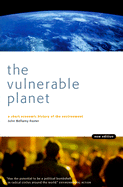Major Works
by John Bellamy Foster
Capitalism
and the Information Age

About this title: Are the new
technologies of the information age reshaping the labor
force, transforming communications, changing the potential
of democracy, and altering the course of history itself?
Capitalism and the Information Age presents a rigorous
examination of some of the most crucial problems and
possibilities of these novel technologies.
The
Vulnerable Planet: A Short Economic History of the
Environment

About this title: The Vulnerable
Planet has won respect as the best single-volume
introduction to the global economic crisis. With impressive
historical and economic detail, ranging from the Industrial
Revolution to modern imperialism, The Vulnerable Planet
explores the reasons why a global economic system geared
toward private profit has spelled vulnerability for the
earth's fragile natural environment. Rejecting both
individualistic solutions and policies that tinker at the
margins, John Bellamy Foster calls for a fundamental
reorganization of production on a social basis.
Hungry
for Profit: The Agribusiness Threat to Farmers, Food, and
the Environment
by Fred Magdoff Frederick H. Buttel, and John Bellamy
Foster (Editors)

About this title: Hungry for Profit
examines the changes underway in world agriculture today and
points the way toward organic, sustainable solutions to
problems of food supply.
Marx's
Ecology: Materialism and Nature

About this title: Progress requires
the conquest of nature. Or does it? This startling new
account overturns conventional interpretations of Marx and
in the process outlines a more rational approach to the
current environmental crisis. Marx, it is often assumed,
cared only about industrial growth and the development of
economic forces. John Bellamy Foster examines Marx's
neglected writings on capitalist agriculture and soil
ecology, philosophical naturalism, and evolutionary theory.
He shows that Marx, known as a powerful critic of capitalist
society, was also deeply concerned with the changing human
relationship to nature. Marx's Ecology covers many other
thinkers, including Epicurus, Charles Darwin, Thomas
Malthus, Ludwig Feuerbach, P. J. Proudhon, and William
Paley. By reconstructing a materialist conception of nature
and society, Marx's Ecology challenges the spiritualism
prevalent in the modern Green movement, pointing toward a
method that offers more lasting and sustainable solutions to
the ecological crisis.
In
Defense of History: Marxism and the Postmodern Agenda
by John Bellamy Foster, Ellen Meiksins Wood

Pox
Americana: Exposing the American Empire
by John Bellamy Foster, Robert W. McChesney (Editors)

About this title: This volume gathers
the work of leading left-wing analysts of imperialism to
examine the burning question of our time--the nature and
prospects of the U.S. imperial project currently being given
shape by war and occupation in the Middle East. Noam
Chomsky, Immanuel Wallerstein, Peter Gowan, and others
discuss the dynamics at work behind the "War on Terrorism."
Their analyses locate recent developments within a longer
historical arc, and set out the central questions for
research and debate: Is U.S. unilateralism and militarism a
sign of the increasing strength of the world's only
remaining superpower? Or a desperate response to the erosion
of the strategy it developed for ensuring its leadership
over the advanced capitalist world during the Cold War?
Essays by Barbara Epstein, Amiya Kumar Bagchi and others
also examine the prospects for the resistance to imperialism
in the United States and globally. Pox Americana brings
together a range of insights and perspectives that were
originally presented at a conference in Burlington, Vermont,
to honor Harry Magdoff on the occasion of his ninetieth
birthday. It is a fitting tribute to Magdoff's pioneering
analyses of U.S. imperialism and a testimony to the
resilience and fruitfulness of the radical tradition.
Ecology
Against Capitalism

About this title: In recent years, John Bellamy
Foster has emerged as a leading theorist of the Marxist
perspective on ecology. His seminal book Marx's Ecology
(Monthly Review Press, 2000) discusses the place of
ecological issues within the intellectual history of Marxism
and on the philosophical foundations of a Marxist ecology,
and has become a major point of reference in ecological
debates. This historical and philosophical focus is now
supplemented by more direct political engagement in his new
book, Ecology against Capitalism. In a broad-ranging
treatment of contemporary ecological politics, Foster deals
with such issues as pollution, sustainable development,
technological responses to environmental crisis, population
growth, soil fertility, the preservation of ancient forests,
and the "new economy" of the Internet age. Foster's
introduction sets out the unifying themes of these essays
enabling the reader to draw from them a consolidated
approach to a rapidly-expanding field of debate which is of
critical importance in our times.
Naked
Imperialism: The U.S. Pursuit of Global Dominance

About this title: During the Cold War years,
mainstream commentators were quick to dismiss the idea that
the United States was an imperialist power. Even when U.S.
interventions led to the overthrow of popular governments,
as in Iran, Guatemala, or the Congo, or wholesale war, as in
Vietnam, this fiction remained intact. During the 1990s and
especially since September 11, 2001, however, it has
crumbled. Today, the need for American empire is openly
proclaimed and defended by mainstream analysts and
commentators. John Bellamy Foster's Naked Imperialism
examines this important transformation in U.S. global policy
and ideology, showing the political and economic roots of
the new militarism and its consequences both in the global
and local context. Foster shows how U.S.-led global
capitalism is preparing the way for a new age of barbarism
and demonstrates the necessity for resistance and solidarity
on a global scale.
Dr.
Elwell's Home Page
©Frank Elwell
Send comments to [email protected]
.
|